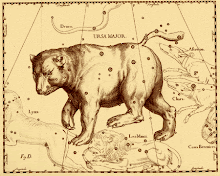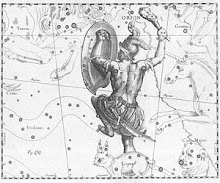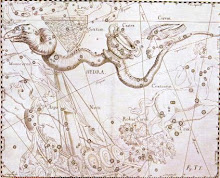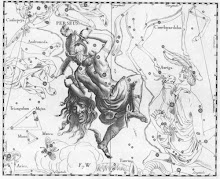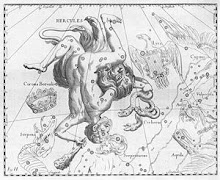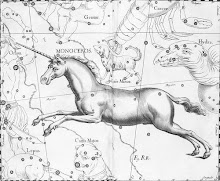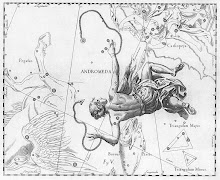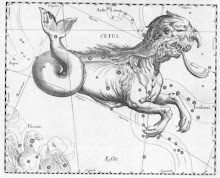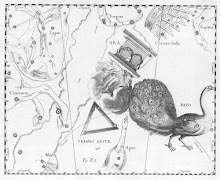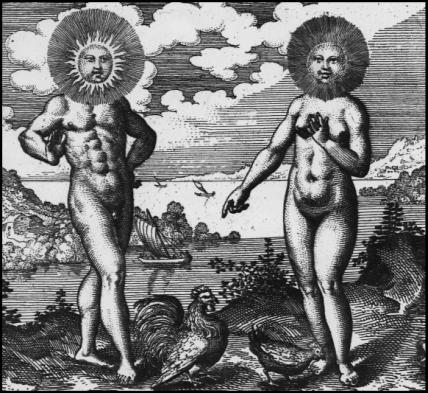THOMAS MALORY Le Morte d'Arthur (Book V)
BOOK V
CHAPTER I. How twelve aged ambassadors of Rome came to King Arthur to demand truage for Britain.
WHEN King Arthur had after long war rested, and held a royal feast and Table Round with his allies of kings, princes, and noble knights all of the Round Table, there came into his hall, he sitting in his throne royal, twelve ancient men, bearing each of them a branch of olive, in token that they came as ambassadors and messengers from the Emperor Lucius, which was called at that time, Dictator or Procuror of the Public Weal of Rome. Which said messengers, after their entering and coming into the presence of King Arthur, did to him their obeisance in making to him reverence, and said to him in this wise: The high and mighty Emperor Lucius sendeth to the King of Britain greeting, commanding thee to acknowledge him for thy lord, and to send him the truage due of this realm unto the Empire, which thy father and other to-fore thy precessors have paid as is of record, and thou as rebel not knowing him as thy sovereign, withholdest and retainest contrary to the statutes and decrees made by the noble and worthy Julius Cesar, conqueror of this realm, and first Emperor of Rome. And if thou refuse his demand and commandment know thou for certain that he shall make strong war against thee, thy realms and lands, and shall chastise thee and thy subjects, that it shall be ensample perpetual unto all kings and princes, for to deny their truage unto that noble empire which domineth upon the universal world. Then when they had showed the effect of their message, the king commanded them to withdraw them, and said he should take advice of council and give to them an answer. Then some of the young knights, hearing this their message, would have run on them to have slain them, saying that it was a rebuke to all the knights there being present to suffer them to say so to the king. And anon the king commanded that none of them, upon pain of death, to missay them nor do them any harm, and commanded a knight to bring them to their lodging, and see that they have all that is necessary and requisite for them, with the best cheer, and that no dainty be spared, for the Romans be great lords, and though their message please me not nor my court, yet I must remember mine honour.
After this the king let call all his lords and knights of the Round Table to counsel upon this matter, and desired them to say their advice. Then Sir Cador of Cornwall spake first and said, Sir, this message liketh me well, for we have many days rested us and have been idle, and now I hope ye shall make sharp war on the Romans, where I doubt not we shall get honour. I believe well, said Arthur, that this matter pleaseth thee well, but these answers may not be answered, for the demand grieveth me sore, for truly I will never pay truage to Rome, wherefore I pray you to counsel me. I have understood that Belinus and Brenius, kings of Britain, have had the empire in their hands many days, and also Constantine the son of Heleine, which is an open evidence that we owe no tribute to Rome but of right we that be descended of them have right to claim the title of the empire.
CHAPTER II. How the kings and lords promised to King Arthur aid and help against the Romans.
THEN answered King Anguish of Scotland, Sir, ye ought of right to be above all other kings, for unto you is none like nor pareil in Christendom, of knighthood nor of dignity, and I counsel you never to obey the Romans, for when they reigned on us they distressed our elders, and put this land to great extortions and tallies, wherefore I make here mine avow to avenge me on them; and for to strengthen your quarrel I shall furnish twenty thousand good men of war, and wage them on my costs, which shall await on you with myself when it shall please you. And the king of Little Britain granted him to the same thirty thousand; wherefore King Arthur thanked them. And then every man agreed to make war, and to aid after their power; that is to wit, the lord of West Wales promised to bring thirty thousand men, and Sir Uwaine, Sir Ider his son, with their cousins, promised to bring thirty thousand. Then Sir Launcelot with all other promised in likewise every man a great multitude.
And when King Arthur understood their courages and good wills he thanked them heartily, and after let call the ambassadors to hear their answer. And in presence of all his lords and knights he said to them in this wise: I will that ye return unto your lord and Procuror of the Common Weal for the Romans, and say ye to him, Of his demand and commandment I set nothing, and that I know of no truage nor tribute that I owe to him, nor to none earthly prince, Christian nor heathen; but I pretend to have and occupy the sovereignty of the empire, wherein I am entitled by the right of my predecessors, sometime kings of this land; and say to him that I am delibered and fully concluded, to go with mine army with strength and power unto Rome, by the grace of God, to take possession in the empire and subdue them that be rebel. Wherefore I command him and all them of Rome, that incontinent they make to me their homage, and to acknowledge me for their Emperor and Governor, upon pain that shall ensue. And then he commanded his treasurer to give to them great and large gifts, and to pay all their dispenses, and assigned Sir Cador to convey them out of the land. And so they took their leave and departed, and took their shipping at Sandwich, and passed forth by Flanders, Almaine, the mountains, and all Italy, until they came unto Lucius. And after the reverence made, they made relation of their answer, like as ye to-fore have heard.
When the Emperor Lucius had well understood their credence, he was sore moved as he had been all araged, and said, I had supposed that Arthur would have obeyed to my commandment, and have served you himself, as him well beseemed or any other king to do. O Sir, said one of the senators, let be such vain words, for we let you wit that I and my fellows were full sore afeard to behold his countenance; I fear me ye have made a rod for yourself, for he intendeth to be lord of this empire, which sore is to be doubted if he come, for he is all another man than ye ween, and holdeth the most noble court of the world, all other kings nor princes may not compare unto his noble maintenance. On New Year's Day we saw him in his estate, which was the royalest that ever we saw, for he was served at his table with nine kings, and the noblest fellowship of other princes, lords, and knights that be in the world, and every knight approved and like a lord, and holdeth Table Round: and in his person the most manly man that liveth, and is like to conquer all the world, for unto his courage it is too little: wherefore I advise you to keep well your marches and straits in the mountains; for certainly he is a lord to be doubted. Well, said Lucius, before Easter I suppose to pass the mountains, and so forth into France, and there bereave him his lands with Genoese and other mighty warriors of Tuscany and Lombardy. And I shall send for them all that be subjects and allied to the empire of Rome to come to mine aid. And forthwith sent old wise knights unto these countries following: first to Ambage and Arrage, to Alexandria, to India, to Armenia, whereas the river of Euphrates runneth into Asia, to Africa, and Europe the Large, to Ertayne and Elamye, to Araby, Egypt, and to Damascus, to Damietta and Cayer, to Cappadocia, to Tarsus, Turkey, Pontus and Pamphylia, to Syria and Galatia. And all these were subject to Rome and many more, as Greece, Cyprus, Macedonia, Calabria, Cateland, Portugal, with many thousands of Spaniards. Thus all these kings, dukes, and admirals, assembled about Rome, with sixteen kings at once, with great multitude of people. When the emperor understood their coming he made ready his Romans and all the people between him and Flanders.
Also he had gotten with him fifty giants which had been engendered of fiends; and they were ordained to guard his person, and to break the front of the battle of King Arthur. And thus departed from Rome, and came down the mountains for to destroy the lands that Arthur had conquered, and came unto Cologne, and besieged a castle thereby, and won it soon, and stuffed it with two hundred Saracens or Infidels, and after destroyed many fair countries which Arthur had won of King Claudas. And thus Lucius came with all his host, which were disperplyd sixty mile in breadth, and commanded them to meet with him in Burgoyne, for he purposed to destroy the realm of Little Britain.
CHAPTER III. How King Arthur held a parliament at York, and how he ordained the realm should be governed in his absence.
NOW leave we of Lucius the Emperor and speak we of King Arthur, that commanded all them of his retinue to be ready at the utas of Hilary for to hold a parliament at York. And at that parliament was concluded to arrest all the navy of the land, and to be ready within fifteen days at Sandwich, and there he showed to his army how he purposed to conquer the empire which he ought to have of right. And there he ordained two governors of this realm, that is to say, Sir Baudwin of Britain, for to counsel to the best, and Sir Constantine, son to Sir Cador of Cornwall, which after the death of Arthur was king of this realm. And in the presence of all his lords he resigned the rule of the realm and Guenever his queen to them, wherefore Sir Launcelot was wroth, for he left Sir Tristram with King Mark for the love of Beale Isould. Then the Queen Guenever made great sorrow for the departing of her lord and other, and swooned in such wise that the ladies bare her into her chamber. Thus the king with his great army departed, leaving the queen and realm in the governance of Sir Baudwin and Constantine. And when he was on his horse he said with an high voice, If I die in this journey I will that Sir Constantine be mine heir and king crowned of this realm as next of my blood. And after departed and entered into the sea at Sandwich with all his army, with a great multitude of ships, galleys, cogs, and dromounds, sailing on the sea.
CHAPTER IV. How King Arthur being shipped and lying in his cabin had a marvellous dream and of the exposition thereof.
AND as the king lay in his cabin in the ship, he fell in a slumbering and dreamed a marvellous dream: him seemed that a dreadful dragon did drown much of his people, and he came flying out of the west, and his head was enamelled with azure, and his shoulders shone as gold, his belly like mails of a marvellous hue, his tail full of tatters, his feet full of fine sable, and his claws like fine gold; and an hideous flame of fire flew out of his mouth, like as the land and water had flamed all of fire. After, him seemed there came out of the orient, a grimly boar all black in a cloud, and his paws as big as a post; he was rugged looking roughly, he was the foulest beast that ever man saw, he roared and romed so hideously that it were marvel to hear. Then the dreadful dragon advanced him and came in the wind like a falcon giving great strokes on the boar, and the boar hit him again with his grizzly tusks that his breast was all bloody, and that the hot blood made all the sea red of his blood. Then the dragon flew away all on an height, and came down with such a swough, and smote the boar on the ridge, which was ten foot large from the head to the tail, and smote the boar all to powder both flesh and bones, that it flittered all abroad on the sea.
And therewith the king awoke anon, and was sore abashed of this dream, and sent anon for a wise philosopher, commanding to tell him the signification of his dream. Sir, said the philosopher, the dragon that thou dreamedst of betokeneth thine own person that sailest here, and the colours of his wings be thy realms that thou hast won, and his tail which is all to-tattered signifieth the noble knights of the Round Table; and the boar that the dragon slew coming from the clouds betokeneth some tyrant that tormenteth the people, or else thou art like to fight with some giant thyself, being horrible and abominable, whose peer ye saw never in your days, wherefore of this dreadful dream doubt thee nothing, but as a conqueror come forth thyself.
Then after this soon they had sight of land, and sailed till they arrived at Barflete in Flanders, and when they were there he found many of his great lords ready, as they had been commanded to wait upon him.
CHAPTER V. How a man of the country told to him of a marvellous giant, and how he fought and conquered him.
THEN came to him an husbandman of the country, and told him how there was in the country of Constantine beside Brittany, a great giant which had slain, murdered and devoured much people of the country, and had been sustained seven year with the children of the commons of that land, insomuch that all the children be all slain and destroyed; and now late he hath taken the Duchess of Brittany as she rode with her meiny, and hath led her to his lodging which is in a mountain, for to ravish and lie by her to her life's end, and many people followed her, more than five hundred, but all they might not rescue her, but they left her shrieking and crying lamentably, wherefore I suppose that he hath slain her in fulfilling his foul lust of lechery. She was wife unto thy cousin Sir Howell, whom we call full nigh of thy blood. Now, as thou art a rightful king, have pity on this lady, and revenge us all as thou art a noble conqueror. Alas, said King Arthur, this is a great mischief, I had liefer than the best realm that I have that I had been a furlong way to-fore him for to have rescued that lady. Now, fellow, said King Arthur, canst thou bring me thereas this giant haunteth? Yea, Sir, said the good man, look yonder whereas thou seest those two great fires, there shalt thou find him, and more treasure than I suppose is in all France. When the king had understood this piteous case, he returned into his tent.
Then he called to him Sir Kay and Sir Bedivere, and commanded them secretly to make ready horse and harness for himself and them twain; for after evensong he would ride on pilgrimage with them two only unto Saint Michael's mount. And then anon he made him ready, and armed him at all points, and took his horse and his shield. And so they three departed thence and rode forth as fast as ever they might till that they came to the foreland of that mount. And there they alighted, and the king commanded them to tarry there, for he would himself go up into that mount. And so he ascended up into that hill till he came to a great fire, and there he found a careful widow wringing her hands and making great sorrow, sitting by a grave new made. And then King Arthur saluted her, and demanded of her wherefore she made such lamentation, to whom she answered and said, Sir knight, speak soft, for yonder is a devil, if he hear thee speak he will come and destroy thee; I hold thee unhappy; what dost thou here in this mountain? for if ye were such fifty as ye be, ye were not able to make resistance against this devil: here lieth a duchess dead, the which was the fairest of all the world, wife to Sir Howell, Duke of Brittany, he hath murdered her in forcing her, and hath slit her unto the navel.
Dame, said the king, I come from the noble conqueror King Arthur, for to treat with that tyrant for his liege people. Fie on such treaties, said she, he setteth not by the king nor by no man else; but an if thou have brought Arthur's wife, dame Guenever, he shall be gladder than thou hadst given to him half France. Beware, approach him not too nigh, for he hath vanquished fifteen kings, and hath made him a coat full of precious stones embroidered with their beards, which they sent him to have his love for salvation of their people at this last Christmas. And if thou wilt, speak with him at yonder great fire at supper. Well, said Arthur, I will accomplish my message for all your fearful words; and went forth by the crest of that hill, and saw where he sat at supper gnawing on a limb of a man, baking his broad limbs by the fire, and breechless, and three fair damosels turning three broaches whereon were broached twelve young children late born, like young birds.
When King Arthur beheld that piteous sight he had great compassion on them, so that his heart bled for sorrow, and hailed him, saying in this wise: He that all the world wieldeth give thee short life and shameful death; and the devil have thy soul; why hast thou murdered these young innocent children, and murdered this duchess? Therefore, arise and dress thee, thou glutton, for this day shalt thou die of my hand. Then the glutton anon started up, and took a great club in his hand, and smote at the king that his coronal fell to the earth. And the king hit him again that he carved his belly and cut off his genitours, that his guts and his entrails fell down to the ground. Then the giant threw away his club, and caught the king in his arms that he crushed his ribs. Then the three maidens kneeled down and called to Christ for help and comfort of Arthur. And then Arthur weltered and wrung, that he was other while under and another time above. And so weltering and wallowing they rolled down the hill till they came to the sea mark, and ever as they so weltered Arthur smote him with his dagger.
And it fortuned they came to the place whereas the two knights were and kept Arthur's horse; then when they saw the king fast in the giant's arms they came and loosed him. And then the king commanded Sir Kay to smite off the giant's head, and to set it upon a truncheon of a spear, and bear it to Sir Howell, and tell him that his enemy was slain; and after let this head be bound to a barbican that all the people may see and behold it; and go ye two up to the mountain, and fetch me my shield, my sword, and the club of iron; and as for the treasure, take ye it, for ye shall find there goods out of number; so I have the kirtle and the club I desire no more. This was the fiercest giant that ever I met with, save one in the mount of Araby, which I overcame, but this was greater and fiercer. Then the knights fetched the club and the kirtle, and some of the treasure they took to themselves, and returned again to the host. And anon this was known through all the country, wherefore the people came and thanked the king. And he said again, Give the thanks to God, and depart the goods among you.
And after that King Arthur said and commanded his cousin Howell, that he should ordain for a church to be builded on the same hill in the worship of Saint Michael. And on the morn the king removed with his great battle, and came into Champayne and in a valley, and there they pight their tents; and the king being set at his dinner, there came in two messengers, of whom that one was Marshal of France, and said to the king that the emperor was entered into France, and had destroyed a great part, and was in Burgoyne, and had destroyed and made great slaughter of people, and burnt towns and boroughs; wherefore, if thou come not hastily, they must yield up their bodies and goods.
CHAPTER VI. How King Arthur sent Sir Gawaine and other to Lucius, and how they were assailed and escaped with worship.
THEN the king did do call Sir Gawaine, Sir Bors, Sir Lionel, and Sir Bedivere, and commanded them to go straight to Sir Lucius, and say ye to him that hastily he remove out of my land; and if he will not, bid him make him ready to battle and not distress the poor people. Then anon these noble knights dressed them to horseback, and when they came to the green wood, they saw many pavilions set in a meadow, of silk of divers colours, beside a river, and the emperor's pavilion was in the middle with an eagle displayed above. To the which tent our knights rode toward, and ordained Sir Gawaine and Sir Bors to do the message, and left in a bushment Sir Lionel and Sir Bedivere. And then Sir Gawaine and Sir Bors did their message, and commanded Lucius, in Arthur's name to avoid his land, or shortly to address him to battle. To whom Lucius answered and said, Ye shall return to your lord, and say ye to him that I shall subdue him and all his lands. Then Sir Gawaine was wroth and said, I had liefer than all France fight against thee; and so had I, said Sir Bors, liefer than all Brittany or Burgoyne.
Then a knight named Sir Gainus, nigh cousin to the emperor, said, Lo, how these Britons be full of pride and boast, and they brag as though they bare up all the world. Then Sir Gawaine was sore grieved with these words, and pulled out his sword and smote off his head. And therewith turned their horses and rode over waters and through woods till they came to their bushment, whereas Sir Lionel and Sir Bedivere were hoving. The Romans followed fast after, on horseback and on foot, over a champaign unto a wood; then Sir Bors turned his horse and saw a knight come fast on, whom he smote through the body with a spear that he fell dead down to the earth; then came Caliburn one of the strongest of Pavie, and smote down many of Arthur's knights. And when Sir Bors saw him do so much harm, he addressed toward him, and smote him through the breast, that he fell down dead to the earth. Then Sir Feldenak thought to revenge the death of Gainus upon Sir Gawaine, but Sir Gawaine was ware thereof, and smote him on the head, which stroke stinted not till it came to his breast. And then he returned and came to his fellows in the bushment. And there was a recounter, for the bushment brake on the Romans, and slew and hew down the Romans, and forced the Romans to flee and return, whom the noble knights chased unto their tents.
Then the Romans gathered more people, and also footmen came on, and there was a new battle, and so much people that Sir Bors and Sir Berel were taken. But when Sir Gawaine saw that, he took with him Sir Idrus the good knight, and said he would never see King Arthur but if he rescued them, and pulled out Galatine his good sword, and followed them that led those two knights away; and he smote him that led Sir Bors, and took Sir Bors from him and delivered him to his fellows. And Sir Idrus in likewise rescued Sir Berel. Then began the battle to be great, that our knights were in great jeopardy, wherefore Sir Gawaine sent to King Arthur for succour, and that he hie him, for I am sore wounded, and that our prisoners may pay goods out of number. And the messenger came to the king and told him his message. And anon the king did do assemble his army, but anon, or he departed the prisoners were come, and Sir Gawaine and his fellows gat the field and put the Romans to flight, and after returned and came with their fellowship in such wise that no man of worship was lost of them, save that Sir Gawaine was sore hurt. Then the king did do ransack his wounds and comforted him. And thus was the beginning of the first journey of the Britons and Romans, and there were slain of the Romans more than ten thousand, and great joy and mirth was made that night in the host of King Arthur. And on the morn he sent all the prisoners into Paris under the guard of Sir Launcelot, with many knights, and of Sir Cador.
CHAPTER VII. How Lucius sent certain spies in a bushment for to have taken his knights being prisoners, and how they were letted.
NOW turn we to the Emperor of Rome, which espied that these prisoners should be sent to Paris, and anon he sent to lie in a bushment certain knights and princes with sixty thousand men, for to rescue his knights and lords that were prisoners. And so on the morn as Launcelot and Sir Cador, chieftains and governors of all them that conveyed the prisoners, as they should pass through a wood, Sir Launcelot sent certain knights to espy if any were in the woods to let them. And when the said knights came into the wood, anon they espied and saw the great embushment, and returned and told Sir Launcelot that there lay in await for them three score thousand Romans. And then Sir Launcelot with such knights as he had, and men of war to the number of ten thousand, put them in array, and met with them and fought with them manly, and slew and detrenched many of the Romans, and slew many knights and admirals of the party of the Romans and Saracens; there was slain the king of Lyly and three great lords, Aladuke, Herawd, and Heringdale. But Sir Launcelot fought so nobly that no man might endure a stroke of his hand, but where he came he showed his prowess and might, for he slew down right on every side; and the Romans and Saracens fled from him as the sheep from the wolf or from the lion, and put them, all that abode alive, to flight.
And so long they fought that tidings came to King Arthur, and anon he graithed him and came to the battle, and saw his knights how they had vanquished the battle, he embraced them knight by knight in his arms, and said, Ye be worthy to wield all your honour and worship; there was never king save myself that had so noble knights. Sir, said Cador, there was none of us failed other, but of the prowess and manhood of Sir Launcelot were more than wonder to tell, and also of his cousins which did that day many noble feats of war. And also Sir Cador told who of his knights were slain, as Sir Berel, and other Sir Moris and Sir Maurel, two good knights. Then the king wept, and dried his eyes with a kerchief, and said, Your courage had near-hand destroyed you, for though ye had returned again, ye had lost no worship; for I call it folly, knights to abide when they be overmatched. Nay, said Launcelot and the other, for once shamed may never be recovered.
CHAPTER VIII. How a senator told to Lucius of their discomfiture, and also of the great battle between Arthur and Lucius.
NOW leave we King Arthur and his noble knights which had won the field, and had brought their prisoners to Paris, and speak we of a senator which escaped from the battle, and came to Lucius the emperor, and said to him, Sir emperor, I advise thee for to withdraw thee; what dost thou here? thou shalt win nothing in these marches but great strokes out of all measure, for this day one of Arthur's knights was worth in the battle an hundred of ours. Fie on thee, said Lucius, thou speakest cowardly; for thy words grieve me more than all the loss that I had this day. And anon he sent forth a king, which hight Sir Leomie, with a great army, and bade him hie him fast to-fore, and he would follow hastily after. King Arthur was warned privily, and sent his people to Sessoine, and took up the towns and castles from the Romans. Then the king commanded Sir Cador to take the rearward, and to take with him certain knights of the Round Table, and Sir Launcelot, Sir Bors, Sir Kay, Sir Marrok, with Sir Marhaus, shall await on our person. Thus the King Arthur disperpled his host in divers parties, to the end that his enemies should not escape.
When the emperor was entered into the vale of Sessoine, he might see where King Arthur was embattled and his banner displayed; and he was beset round about with his enemies, that needs he must fight or yield him, for he might not flee, but said openly unto the Romans, Sirs, I admonish you that this day ye fight and acquit you as men, and remember how Rome domineth and is chief and head over all the earth and universal world, and suffer not these Britons this day to abide against us; and therewith he did command his trumpets to blow the bloody sounds, in such wise that the ground trembled and dindled.
Then the battles approached and shoved and shouted on both sides, and great strokes were smitten on both sides, many men overthrown, hurt, and slain; and great valiances, prowesses and appertices of war were that day showed, which were over long to recount the noble feats of every man, for they should contain an whole volume. But in especial, King Arthur rode in the battle exhorting his knights to do well, and himself did as nobly with his hands as was possible a man to do; he drew out Excalibur his sword, and awaited ever whereas the Romans were thickest and most grieved his people, and anon he addressed him on that part, and hew and slew down right, and rescued his people; and he slew a great giant named Galapas, which was a man of an huge quantity and height, he shorted him and smote off both his legs by the knees, saying, Now art thou better of a size to deal with than thou were, and after smote off his head. There Sir Gawaine fought nobly and slew three admirals in that battle. And so did all the knights of the Round Table. Thus the battle between King Arthur and Lucius the Emperor endured long. Lucius had on his side many Saracens which were slain. And thus the battle was great, and oftsides that one party was at a fordeal and anon at an afterdeal, which endured so long till at the last King Arthur espied where Lucius the Emperor fought, and did wonder with his own hands. And anon he rode to him. And either smote other fiercely, and at last Lucius smote Arthur thwart the visage, and gave him a large wound. And when King Arthur felt himself hurt, anon he smote him again with Excalibur that it cleft his head, from the summit of his head, and stinted not till it came to his breast. And then the emperor fell down dead and there ended his life.
And when it was known that the emperor was slain, anon all the Romans with all their host put them to flight, and King Arthur with all his knights followed the chase, and slew down right all them that they might attain. And thus was the victory given to King Arthur, and the triumph; and there were slain on the part of Lucius more than an hundred thousand. And after King Arthur did do ransack the dead bodies, and did do bury them that were slain of his retinue, every man according to the estate and degree that he was of. And them that were hurt he let the surgeons do search their hurts and wounds, and commanded to spare no salves nor medicines till they were whole.
Then the king rode straight to the place where the Emperor Lucius lay dead, and with him he found slain the Soudan of Syria, the King of Egypt and of Ethiopia, which were two noble kings, with seventeen other kings of divers regions, and also sixty senators of Rome, all noble men, whom the king did do balm and gum with many good gums aromatic, and after did do cere them in sixty fold of cered cloth of sendal, and laid them in chests of lead, because they should not chafe nor savour, and upon all these bodies their shields with their arms and banners were set, to the end they should be known of what country they were. And after he found three senators which were alive, to whom he said, For to save your lives I will that ye take these dead bodies, and carry them with you unto great Rome, and present them to the Potestate on my behalf, shewing him my letters, and tell them that I in my person shall hastily be at Rome. And I suppose the Romans shall beware how they shall demand any tribute of me. And I command you to say when ye shall come to Rome, to the Potestate and all the Council and Senate, that I send to them these dead bodies for the tribute that they have demanded. And if they be not content with these, I shall pay more at my coming, for other tribute owe I none, nor none other will I pay. And methinketh this sufficeth for Britain, Ireland and all Almaine with Germany. And furthermore, I charge you to say to them, that I command them upon pain of their heads never to demand tribute nor tax of me nor of my lands. Then with this charge and commandment, the three senators aforesaid departed with all the said dead bodies, laying the body of Lucius in a car covered with the arms of the Empire all alone; and after alway two bodies of kings in a chariot, and then the bodies of the senators after them, and so went toward Rome, and showed their legation and message to the Potestate and Senate, recounting the battle done in France, and how the field was lost and much people and innumerable slain. Wherefore they advised them in no wise to move no more war against that noble conqueror Arthur, for his might and prowess is most to be doubted, seen the noble kings and great multitude of knights of the Round Table, to whom none earthly prince may compare.
CHAPTER IX How Arthur, after he had achieved the battle against the Romans, entered into Almaine, and so into Italy.
NOW turn we unto King Arthur and his noble knights, which, after the great battle achieved against the Romans, entered into Lorraine, Brabant and Flanders, and sithen returned into Haut Almaine, and so over the mountains into Lombardy, and after, into Tuscany wherein was a city which in no wise would yield themself nor obey, wherefore King Arthur besieged it, and lay long about it, and gave many assaults to the city; and they within defended them valiantly. Then, on a time, the king called Sir Florence, a knight, and said to him they lacked victual, And not far from hence be great forests and woods, wherein be many of mine enemies with much bestial: I will that thou make thee ready and go thither in foraying, and take with thee Sir Gawaine my nephew, Sir Wisshard, Sir Clegis, Sir Cleremond, and the Captain of Cardiff with other, and bring with you all the beasts that ye there can get.
And anon these knights made them ready, and rode over holts and hills, through forests and woods, till they came into a fair meadow full of fair flowers and grass; and there they rested them and their horses all that night. And in the springing of the day in the next morn, Sir Gawaine took his horse and stole away from his fellowship, to seek some adventures. And anon he was ware of a man armed, walking his horse easily by a wood's side, and his shield laced to his shoulder, sitting on a strong courser, without any man saving a page bearing a mighty spear. The knight bare in his shield three griffins of gold, in sable carbuncle, the chief of silver. When Sir Gawaine espied this gay knight, he feutred his spear, and rode straight to him, and demanded of him from whence that he was. That other answered and said he was of Tuscany, and demanded of Sir Gawaine, What, profferest thou, proud knight, thee so boldly? here gettest thou no prey, thou mayest prove what thou wilt, for thou shalt be my prisoner or thou depart. Then said Gawaine, thou avauntest thee greatly and speakest proud words, I counsel thee for all thy boast that thou make thee ready, and take thy gear to thee, to-fore greater grame fall to thee.
CHAPTER X. Of a battle done by Sir Gawaine against a Saracen, which after was yielden and became Christian.
THEN they took their spears and ran each at other with all the might they had, and smote each other through their shields into their shoulders, wherefore anon they pulled out their swords, and smote great strokes that the fire sprang out of their helms. Then Sir Gawaine was all abashed, and with Galatine his good sword he smote through shield and thick hauberk made of thick mails, and all to-rushed and break the precious stones, and made him a large wound, that men might see both liver and lung. Then groaned that knight, and addressed him to Sir Gawaine, and with an awk stroke gave him a great wound and cut a vein, which grieved Gawaine sore, and he bled sore. Then the knight said to Sir Gawaine, bind thy wound or thy blee[ding] change, for thou be-bleedest all thy horse and thy fair arms, for all the barbers of Brittany shall not con staunch thy blood, for whosomever is hurt with this blade he shall never be staunched of bleeding. Then answered Gawaine, it grieveth me but little, thy great words shall not fear me nor lessen my courage, but thou shalt suffer teen and sorrow or we depart, but tell me in haste who may staunch my bleeding. That may I do, said the knight, if I will, and so will I if thou wilt succour and aid me, that I may be christened and believe on God, and thereof I require thee of thy manhood, and it shall be great merit for thy soul. I grant, said Gawaine, so God help me, to accomplish all thy desire, but first tell me what thou soughtest here thus alone, and of what land and liegiance thou art of. Sir, he said, my name is Priamus, and a great prince is my father, and he hath been rebel unto Rome and overridden many of their lands. My father is lineally descended of Alexander and of Hector by right line. And Duke Joshua and Maccabaeus were of our lineage. I am right inheritor of Alexandria and Africa, and all the out isles, yet will I believe on thy Lord that thou believest on; and for thy labour I shall give thee treasure enough. I was so elate and hauteyn in my heart that I thought no man my peer, nor to me semblable. I was sent into this war with seven score knights, and now I have encountered with thee, which hast given to me of fighting my fill, wherefore sir knight, I pray thee to tell me what thou art. I am no knight, said Gawaine, I have been brought up in the guardrobe with the noble King Arthur many years, for to take heed to his armour and his other array, and to point his paltocks that long to himself. At Yule last he made me yeoman, and gave to me horse and harness, and an hundred pound in money; and if fortune be my friend, I doubt not but to be well advanced and holpen by my liege lord. Ah, said Priamus, if his knaves be so keen and fierce, his knights be passing good: now for the King's love of Heaven, whether thou be a knave or a knight, tell thou me thy name. By God, said Sir Gawaine, now I will say thee sooth, my name is Sir Gawaine, and known I am in his court and in his chamber, and one of the knights of the Round Table, he dubbed me a duke with his own hand. Therefore grudge not if this grace is to me fortuned, it is the goodness of God that lent to me my strength. Now am I better pleased, said Priamus, than thou hadst given to me all the Provence and Paris the rich. I had liefer to have been torn with wild horses, than any varlet had won such loos, or any page or priker should have had prize on me. But now sir knight I warn thee that hereby is a Duke of Lorraine with his army, and the noblest men of Dolphiny, and lords of Lombardy, with the garrison of Godard, and Saracens of Southland, y-numbered sixty thousand of good men of arms; wherefore but if we hie us hence, it will harm us both, for we be sore hurt, never like to recover; but take heed to my page, that he no horn blow, for if he do, there be hoving here fast by an hundred knights awaiting on my person, and if they take thee, there shall no ransom of gold nor silver acquit thee.
Then Sir Gawaine rode over a water for to save him, and the knight followed him, and so rode forth till they came to his fellows which were in the meadow, where they had been all the night. Anon as Sir Wisshard was ware of Sir Gawaine and saw that he was hurt, he ran to him sorrowfully weeping, and demanded of him who had so hurt him; and Gawaine told how he had foughten with that man, and each of them had hurt other, and how he had salves to heal them; but I can tell you other tidings, that soon we shall have ado with many enemies.
Then Sir Priamus and Sir Gawaine alighted, and let their horses graze in the meadow, and unarmed them, and then the blood ran freshly from their wounds. And Priamus took from his page a vial full of the four waters that came out of Paradise, and with certain balm anointed their wounds, and washed them with that water, and within an hour after they were both as whole as ever they were. And then with a trumpet were they all assembled to council, and there Priamus told unto them what lords and knights had sworn to rescue him, and that without fail they should be assailed with many thousands, wherefore he counselled them to withdraw them. Then Sir Gawaine said, it were great shame to them to avoid without any strokes; Wherefore I advise to take our arms and to make us ready to meet with these Saracens and misbelieving men, and with the help of God we shall overthrow them and have a fair day on them. And Sir Florence shall abide still in this field to keep the stale as a noble knight, and we shall not forsake yonder fellows. Now, said Priamus, cease your words, for I warn you ye shall find in yonder woods many perilous knights; they will put forth beasts to call you on, they be out of number, and ye are not past seven hundred, which be over few to fight with so many. Nevertheless, said Sir Gawaine, we shall once encounter them, and see what they can do, and the best shall have the victory.
CHAPTER XI. How the Saracens came out of a wood for to rescue their beasts, and of a great battle.
THEN Sir Florence called to him Sir Floridas, with an hundred knights, and drove forth the herd of beasts. Then followed him seven hundred men of arms; and Sir Ferant of Spain on a fair steed came springing out of the woods, and came to Sir Florence and asked him why he fled. Then Sir Florence took his spear and rode against him, and smote him in the forehead and brake his neck bone. Then all the other were moved, and thought to avenge the death of Sir Ferant, and smote in among them, and there was great fight, and many slain and laid down to ground, and Sir Florence with his hundred knights alway kept the stale, and fought manly.
Then when Priamus the good knight perceived the great fight, he went to Sir Gawaine, and bade him that he should go and succour his fellowship, which were sore bestead with their enemies. Sir, grieve you not, said Sir Gawaine, for their gree shall be theirs. I shall not once move my horse to them ward, but if I see more than there be; for they be strong enough to match them.
And with that he saw an earl called Sir Ethelwold and the duke of Dutchmen, came leaping out of a wood with many thousands, and Priamus' knights, and came straight unto the battle. Then Sir Gawaine comforted his knights, and bade them not to be abashed, for all shall be ours. Then they began to wallop and met with their enemies, there were men slain and overthrown on every side. Then thrust in among them the knights of the Table Round, and smote down to the earth all them that withstood them, in so much that they made them to recoil and flee. By God, said Sir Gawaine, this gladdeth my heart, for now be they less in number by twenty thousand. Then entered into the battle Jubance a giant, and fought and slew down right, and distressed many of our knights, among whom was slain Sir Gherard, a knight of Wales. Then our knights took heart to them, and slew many Saracens. And then came in Sir Priamus with his pennon, and rode with the knights of the Round Table, and fought so manfully that many of their enemies lost their lives. And there Sir Priamus slew the Marquis of Moises land, and Sir Gawaine with his fellows so quit them that they had the field, but in that stour was Sir Chestelaine, a child and ward of Sir Gawaine slain, wherefore was much sorrow made, and his death was soon avenged. Thus was the battle ended, and many lords of Lombardy and Saracens left dead in the field.
Then Sir Florence and Sir Gawaine harboured surely their people, and took great plenty of bestial, of gold and silver, and great treasure and riches, and returned unto King Arthur, which lay still at the siege. And when they came to the king they presented their prisoners and recounted their adventures, and how they had vanquished their enemies.
CHAPTER XII. How Sir Gawaine returned to King Arthur with his prisoners, and how the King won a city, and how he was crowned Emperor.
NOW thanked be God, said the noble King Arthur. But what manner man is he that standeth by himself, him seemeth no prisoner. Sir, said Gawaine, this is a good man of arms, he hath matched me, but he is yielden unto God, and to me, for to become Christian; had not he have been we should never have returned, wherefore I pray you that he may be baptised, for there liveth not a nobler man nor better knight of his hands. Then the king let him anon be christened, and did do call him his first name Priamus, and made him a duke and knight of the Table Round. And then anon the king let do cry assault to the city, and there was rearing of ladders, breaking of walls, and the ditch filled, that men with little pain might enter into the city. Then came out a duchess, and Clarisin the countess, with many ladies and damosels, and kneeling before King Arthur, required him for the love of God to receive the city, and not to take it by assault, for then should many guiltless be slain. Then the king avaled his visor with a meek and noble countenance, and said, Madam, there shall none of my subjects misdo you nor your maidens, nor to none that to you belong, but the duke shall abide my judgment. Then anon the king commanded to leave the assault, and anon the duke's oldest son brought out the keys, and kneeling delivered them to the king, and besought him of grace; and the king seized the town by assent of his lords, and took the duke and sent him to Dover, there for to abide prisoner term of his life, and assigned certain rents for the dower of the duchess and for her children.
Then he made lords to rule those lands, and laws as a lord ought to do in his own country; and after he took his journey toward Rome, and sent Sir Floris and Sir Floridas to-fore, with five hundred men of arms, and they came to the city of Urbino and laid there a bushment, thereas them seemed most best for them, and rode to-fore the town, where anon issued out much people and skirmished with the fore-riders. Then brake out the bushment and won the bridge, and after the town, and set upon the walls the king's banner. Then came the king upon an hill, and saw the city and his banner on the walls, by which he knew that the city was won. And anon he sent and commanded that none of his liege men should defoul nor lie by no lady, wife nor maid; and when he came into the city, he passed to the castle, and comforted them that were in sorrow, and ordained there a captain, a knight of his own country.
And when they of Milan heard that thilk city was won, they sent to King Arthur great sums of money, and besought him as their lord to have pity on them, promising to be his subjects for ever, and yield to him homage and fealty for the lands of Pleasance and Pavia, Petersaint, and the Port of Tremble, and to give him yearly a million of gold all his lifetime. Then he rideth into Tuscany, and winneth towns and castles, and wasted all in his way that to him will not obey, and so to Spolute and Viterbe, and from thence he rode into the Vale of Vicecount among the vines. And from thence he sent to the senators, to wit whether they would know him for their lord. But soon after on a Saturday came unto King Arthur all the senators that were left alive, and the noblest cardinals that then dwelt in Rome, and prayed him of peace, and proferred him full large, and besought him as governor to give licence for six weeks for to assemble all the Romans, and then to crown him emperor with chrism as it belongeth to so high estate. I assent, said the king, like as ye have devised, and at Christmas there to be crowned, and to hold my Round Table with my knights as me liketh. And then the senators made ready for his enthronization. And at the day appointed, as the romance telleth, he came into Rome, and was crowned emperor by the pope's hand, with all the royalty that could be made, and sojourned there a time, and established all his lands from Rome into France, and gave lands and realms unto his servants and knights, to everych after his desert, in such wise that none complained, rich nor poor. And he gave to Sir Priamus the duchy of Lorraine; and he thanked him, and said he would serve him the days of his life; and after made dukes and earls, and made every man rich.
Then after this all his knights and lords assembled them afore him, and said: Blessed be God, your war is finished and your conquest achieved, in so much that we know none so great nor mighty that dare make war against you: wherefore we beseech you to return homeward, and give us licence to go home to our wives, from whom we have been long, and to rest us, for your journey is finished with honour and worship. Then said the king, Ye say truth, and for to tempt God it is no wisdom, and therefore make you ready and return we into England. Then there was trussing of harness and baggage and great carriage. And after licence given, he returned and commanded that no man in pain of death should not rob nor take victual, nor other thing by the way but that he should pay therefore. And thus he came over the sea and landed at Sandwich, against whom Queen Guenever his wife came and met him, and he was nobly received of all his commons in every city and burgh, and great gifts presented to him at his home-coming to welcome him with.
Thus endeth the fifth book of the conquest that King Arthur had against Lucius the Emperor of Rome, and here followeth the sixth book, which is of Sir Launcelot du Lake.
LA LÉGENDE D'HIRAM
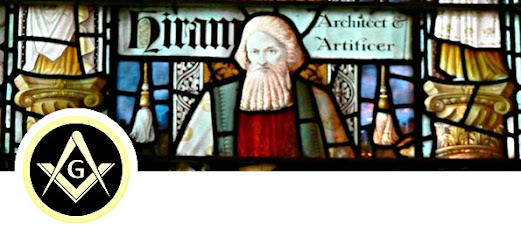
Articles les plus récents
LES SENTIERS D’HERMÈS







































